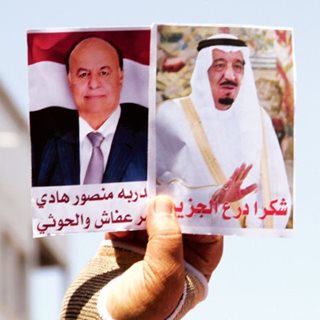Yemen intervention: Gulf states pull the trigger
Joyce Karam/Al Arabiya/Thursday, 26 March 2015
In announcing the military operation involving nine Arab nations and Pakistan in Yemen, Saudi’s ambassador to Washington Adel Al-Jubeir said the use of force was a last resort, and a decision taken with a “great deal of reluctance” after the Iran-backed Houthi militants and their allies rejected several attempts at a political solution.
For Yemen watchers, the intervention should not have come as a surprise. Since last September, and the Houthis takeover of Sanaa, the Yemeni state has been unraveling. The Houthis aided by the deposed President Ali Abdullah Saleh orchestrated an ambitious and phased military coup in Yemen.
The Houthis overreached
In their gradual coup, the Houthis overplayed their local and regional hand, compounding their gains, but at the same time their enemies and prompting a military response. The Houthis not only forced the elected Yemeni government to resign in January, but pushed its draft constitution, took over the security headquarters, brushed off the transition, and stormed into the homes of activists and journalists among them Nobel Peace Laureate Tawakol Karman.
The Houthis wanted everyone to play by their rules or otherwise be eliminated. They overreached in rejecting political talks, alienating opposite sides of the political spectrum such as the Muslim Brotherhood as well as the tribes, and they went against the Western interests as well as Arab countries, even issuing threats to invade Mecca. In strengthening their ties with Iran and ensuing chaos in Yemen, the Houthi militants also played right into the hands of AQAP and ISIS who have rejuvenated their support in the country in the last six months.
Defining moment
The military operation, albeit its limited goals of saving the government of Abd Rabbuh Hadi and preventing the country from becoming a failed state, is a defining moment for the Gulf Cooporation Council, Egypt and intra-Arab relations. It is the first time since the Gulf war and the liberation of Kuwait in 1990-91, that this many Arab countries (Egypt, Jordan, Saudi, Qatar, UAE, Morocco, Sudan, Bahrain and Kuwait) joined in one military front. It is also unprecedented since the Arab-Israeli wars of 1967 and 1973, that nine Arab countries decided to go to war without the participation of the United States, the United Kingdom, or Europe. The intervention is a statement of a more confident GCC in its defenses and political vision.
In many ways, the intervention in Yemen is the first foreign policy test for the Saudi King Salman Bin Abdul Aziz after less than 100 days in office (23 January). But the political vision on the new king, prompting regional reconciliation within GCC, and focusing on bigger threats such as Iran’s regional ambitions and terrorism, that have fomented this coalition on Yemen.
Saudi’s 1,800 km border with Yemen, and the fate of the Bab el Mandeb strait as the Houthis kept pushing South, gave more urgency for the intervention. But Iran’s blatant support and embrace of the Houthis, training over 600 militants and emboldening their sectarian rhetoric, raised security alarms among the GCC countries.
Obama’s open support
In announcing the military operation from the Saudi embassy in Washington, and less than two-miles-away from the White House, the message from Al-Jubeir emphasized closed consultations and support from the Obama administration. The White House’s own statement on Yemen shows a loud and vocal support for the military operation. It declared that “President Obama has authorized the provision of logistical and intelligence support to GCC-led military operations” and that the United States “coordinates closely with Saudi Arabia and our GCC partners on issues related to their security and our shared interests.”
Obama’s support is not paying lip service or for regional posturing purposed in the Middle East. It has basis in shared goals and interests in the operation, mainly in preventing Yemen from becoming a terrorist hub, and maintaining Gulf security. The Houthis coup and the level of chaos that is fragmenting Yemen and inviting every terrorist entity into Sanaa, is a nightmare scenario for Washington who had invested intelligence and financial resources in counterterrorism in Yemen. Just last weekend and after closing the U.S. embassy in Sanaa in February, U.S. special operations forces departed Yemen.
The departure of Special Forces and the diplomatic and intelligence void that the U.S. has left in Yemen is a big blow to Washington’s counterterrorism efforts. The Chairman of the House Homeland Security committee Michael McCaul told ABC: “Because we are withdrawing completely, we will have no intelligence footprint or capabilities to monitor what AQAP and ISIS and the Shiite militants are doing in the region.”
The Houthis coup has also cost Washington more than $500 million in military aid. We also learned yesterday that the Houthis looted files on U.S. spy operations. The events over the last six months are a recipe for disaster for the Obama administration. While the Yemen intervention will need key components such as tribal support and a multifaceted socioeconomic strategy that goes beyond airstrikes to succeed, it ushers a new era on how GCC responds to threats as well as a more independent framework for its relations with the United States.























